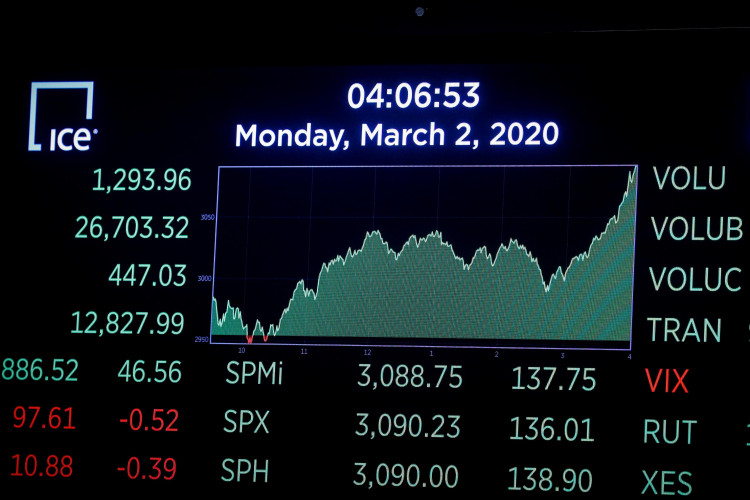US stocks made a surprise ascent in the final hours of Monday's trading, with the Dow Jones Industrial notching a single-day point record after escalating coronavirus jitters hurled global markets into a weeklong tailspin.
It was one of the worst weeks for world markets since 2008 financial turmoil as capitalists hinged on promises that world leaders would step in to help if the global economy was battered by the epidemic.
Over the course of one wild week in the financial trading floors, carefully charted yearly price targets on companies and key bond indices have been shattered to tiny bits.
The strong rebound sent blue-chip stocks advancing by over 1,290 points, which breached the previous record attained in December 2018 and averted a painful seven-session free fall. In terms of percentage, the NASDAQ and S&P 500 Index both saw their most impressive turnaround in more than four quarters.
The S&P 500 soared 4.9 percent, the biggest 24-hour rally since late 2018. The push followed reports that central bankers from the world's leading economies would participate in a conference call with the Group of 7 finance chiefs on Tuesday to chart their next move against the virus, sparking expectations among traders that governments might cut interest rates in the process.
However, investors are not totally convinced that the worst is over, as the outbreak continues to make its way into other countries. Globally, the number of infections is nearing the 90,000 mark, while the death figures have surpassed 3,000. At least for the moment, investors seem to be ignoring the new cases and fatalities that have started to spook the US.
The outbreak has already "stoked expectations of a coordinated reduction," said Roberto Perli, a former Federal Reserve analyst who currently works as an economist at Cornerstone Macro. "If it (rate cut) does not happen, it will only add to market instability," he stressed.
Last week, the aggressive spread of the virus across nations outside of China jolted global markets, hurling all three of the large indices into a correction in just a few days, and dragging safe-haven equity yields to new lows.
The huge market sell-off contributed to almost $7 trillion in market value being wiped out, according to S&P/Dow Jones' Howard Silverblatt - only a portion of which was reversed by Monday's rally. "We are not yet completely out of the woods," noted Chris Pollard, chief of market planning at Cowen.





